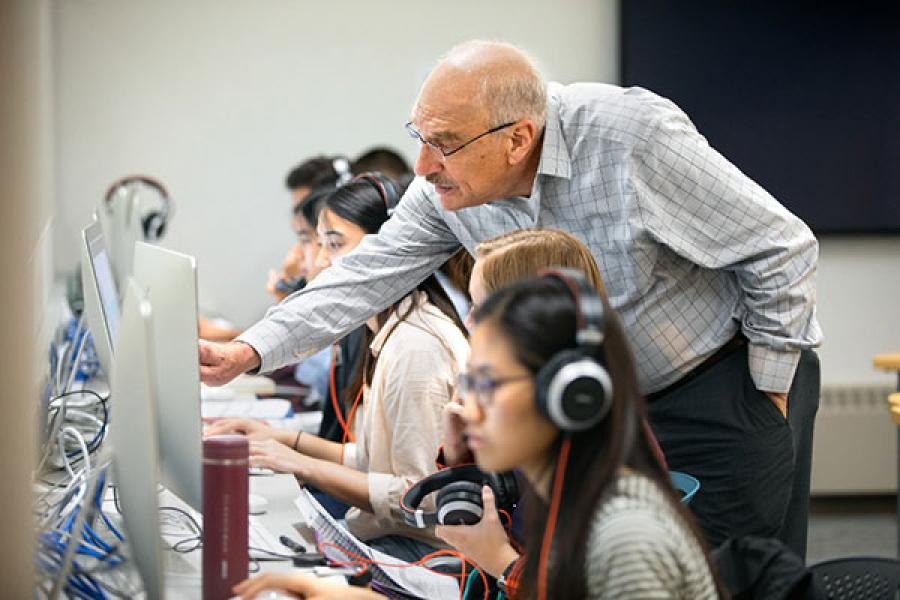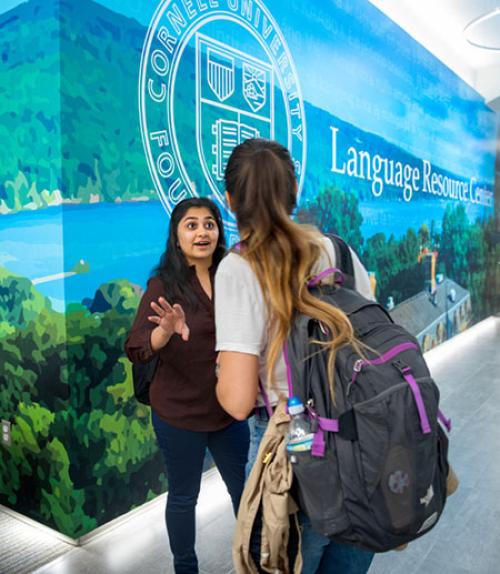Forty years ago when Richard “Dick” Feldman arrived at Cornell, students learning a language had only a basement lab in Morrill Hall stocked with audio tapes to help them. When Feldman retires on June 30, new director Angelika Kraemer will take the helm of a robust Language Resource Center bustling with technology, programs, and resources.
“I’ve loved my position here,” says Feldman. “I think teaching and language learning is a fine human activity that brings out some of the best in the students and brings together some of the finest people to do it.”
Kraemer is enthusiastic about the position, too, describing the LRC as “wonderful and amazing,” adding “I’m very excited to build on everything that is already in place. I’m looking forward to advancing programmatic efforts to bring more units together and to provide more resources for language learning and teaching at Cornell and hopefully also in the community.”
Kraemer says she is particularly impressed with two innovative programs Feldman launched to expand language access at Cornell: the Jumpstart and Foreign Language Across Curriculum (FLAC) courses.
The Jumpstart program offers one-credit, one-hour-a-week courses for students going abroad during the summer or winter break, to prepare them for the countries they’re visiting. The program complements the more in-depth language study that semester abroad students typically get. In addition to vocabulary and an introduction to grammar, Jumpstart classes offer cultural orientation to allow students to feel more comfortable and to behave in culturally appropriate ways, including an emphasis on awareness of cultural differences and cues.
LRC’s FLAC program supports students’ use of foreign language skills by adding a foreign language section to a regular course. The FLAC program offers discussion sessions that link content knowledge with language acquisition, offers insights into foreign cultures and area studies, provides experiences of analyzing texts in the original language, deepens technical and content-specific vocabulary, and aids in the preparation for study abroad and outreach programs.
Such initiatives help demonstrate why language learning and being knowledgeable about different cultures are important, says Kraemer. “There are many benefits to learning languages and being knowledgeable about different cultures. One role of the LRC is to articulate these benefits to its various stakeholders and engage in advocacy.””
As Executive Associate Director of the Center for Language Teaching Advancement at Michigan State University since 2013, Kraemer has sought to share what she calls the “transformative power of language.” One initiative that has been particularly successful is the Language Advocacy Campaign, a storytelling project which includes outreach events as well as a website featuring interviews with students, alumni, faculty, staff, and community members discussing how the ability to speak a different language and being able to interact with people of different cultures has improved their lives.
Having entered the fields of language learning and technology as well as language center design and management right after graduate school, Kraemer brings to Cornell a familiarity with emerging technologies, space design, and new approaches to language teaching and learning that she hopes will enrich the already robust language learning at Cornell. She holds B.A. equivalents in German and English from the Albert-Ludwigs-Universität Freiburg, Germany; and an M.A. in German studies, an M.A. in Teaching English to Speakers of Other Languages, and a Ph.D. in German Studies from Michigan State University.
Kraemer praises LRC’s beautiful new space, which has allowed the LRC to expand its programs with the move from Noyes Lodge to Stimson Hall. The move has been tremendously positive, says Feldman. “We’re so central here now, close to students and teachers, that it’s very easy for students to drop in,” says Feldman. “During the spring semester we launched language conversation hours in 17 different languages. We couldn’t have done it in Noyes Lodge because students just wouldn’t have come.”
The many languages taught at Cornell have no single home – Yoruba is offered through the African Studies and Research Center, for example, while French, Spanish, and Italian are offered through the Department of Romance Studies. The LRC serves as the focal point for all language teachers and language learning at Cornell. Feldman, who has been involved with the LRC since its creation in 1999, says he’s most proud during his tenure of providing professional support and a supportive home for language teachers embedded in multiple departments.
“One main thing I’ve done is bring in speakers to present the language field here, to keep teachers up to date and share their intellectual life with others doing the same work. Most of the leading people in the field have spoken at Cornell,” says Feldman.
In addition to providing educational support for the teachers, Feldman says he has “worked to recognize the excellent work our language teachers do and make it more widely known, and give them a sense of agency and confidence in moving their own work forward.” As an example, he points to LRC’s last event of the year, at which nine teachers presented projects, for most of which the LRC provided support, including six projects focused on developing innovative materials for language teaching.
Richard Feldman working with students at the Language Resource Center
Along with traditional study carrels, the LRC operates audio and video production and videoconferencing facilities and hosts Web Audio Lab (WAL), an extensive online language resource. WAL, created by Russian language teacher Slava Paperno with staff members of the Academic Technology Center and the Language Resource Center, allows students to record their responses on their own computers and have them automatically uploaded for teacher review. The application efficiently allows students to practice listening and speaking on their own in languages including Chinese, Japanese, , Russian, Yoruba, Bengali and French, among others..
Although Cornell offers a wide breadth of languages – more than fifty – Feldman has worked to expand those offerings even more through an initiative with other colleges to teach less commonly taught languages, such as Wolof and Hungarian through the Shared Course Initiative.
Another initiative by the LRC, initiated by Dan Gaibel and Sam Lupowitz of the LRC, is a recently launched podcast, Speaking of Language, that focuses on language learning and pedagogy. As Feldman says in an episode titled “Language, Technology, and the Future,” “We use language primarily for social purposes, that’s what it’s about. You need to get people together and interact...There’s a social turn that’s at the essence of language teaching, so we need ways to facilitate that and make it happen.”
Kraemer agrees, and is looking forward to reaching out to those involved with languages across campus and listening to ideas and needs. She describes her vision of leadership as creating a space for creativity, collaboration, and innovation. “It’s about connections, listening to people, reaching out to all the different units that currently are involved but also units that aren’t involved yet,” she explains, adding, that “everybody I’ve interacted with so far, starting from the campus visit to now, has been tremendously welcoming and warm. I’m so much looking forward to stepping into an environment like that. I feel people are really interested in collaborative efforts and in sharing ideas. I’m very excited."
A version of this article also appeared in the Cornell Chronicle,





